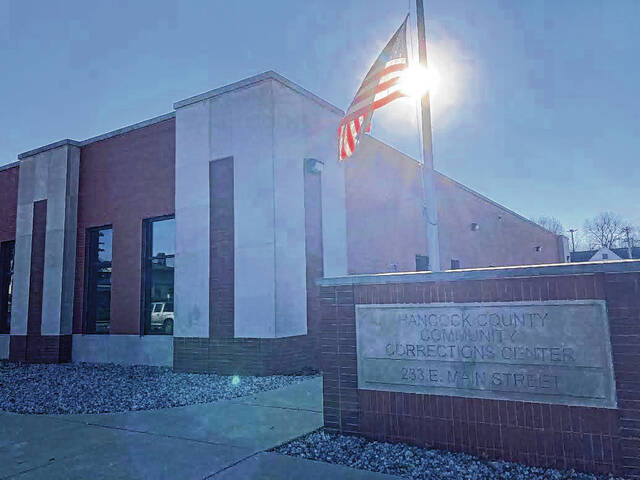
County officials are debating the future of the Community Corrections building, with its current occupant reluctant to move out.
GREENFIELD — With the construction of Hancock County’s new jail coming to a close, county officials are working to solidify plans for current jail, reopening questions about the future offices of several departments.
Work on the renovation of the existing jail building will be led by Scott Carnegie of DLZ, an Indianapolis-based architecture and engineering firm. Carnegie spoke at a recent meeting of the county commissioners and other officials about the direction of the project. DLZ specializes in “justice-related architecture,” he said, which can include jails as well as sheriff’s offices, community corrections buildings and others.
Carnegie said the firm is striving to create a big-picture look at the county’s needs before it focuses on individual design elements.
“There will be additional, follow-up meetings with every department as we kind of fine-tune the details,” Carnegie said.
The officials discussed a design plan that was created in 2018. However, many of the current stakeholders weren’t involved in the 2018 study.
Part of that study proposed that Hancock County Community Corrections move into the existing jail, 123 E. Main St., while the community corrections building, next door at 233 E. Main St., would be renovated for use by the prosecutor’s office. The historic building where the prosecutor’s office is located on American Legion Place, itself the original Hancock County jail, is in poor condition and has limited space.
However, community corrections director Wade Kennedy said his office’s strong preference is to stay in its current location. With the new jail opening soon and an unlimited number of home detention slots, he said, he doesn’t support the idea that the work-release program needs a larger space.
“It’s just my opinion that we’ve put enough into this building to make it the perfect place for our needs now, I’d hate to see all of that go to waste and get demolished,” Kennedy said.
The county commissioners questioned that idea. Commissioner John Jessup said that with the continual growth of the county, the need for work release is only going to grow. The current space can accommodate 70 to 80 people, though Kennedy said it could fit as many as 100 if needed.
Kennedy said that giving community corrections a larger space in the existing jail would actually make it harder for the department’s limited number of employees to do everything that’s needed. He also said work release should remain a relatively small program, since it is designed to be a privilege for only some low-level felons.
“The idea would be to start people there and once they’re stable — got a job, got a place to live — transfer them to home detention,” Kennedy said.
Kennedy added that he is hoping to restart the work-release program, which has been shut down due to COVID-19, once the sheriff’s department has moved to the new jail in early 2022. He said construction could further delay the re-opening of the program.
Prosecutor Brent Eaton said he thought it would be “unbelievably short-sighted” to limit the number of people that can be accommodated by work-release when the county’s population will only continue growing.
“As we have a higher volume of cases proceeding through the courts, it stands to reason that there will be a higher number of people that may go there,” Eaton said. “It would be a tragedy for us to have the opportunity to make our overall justice system one where we were able to serve our community for a longer period of time, and to refuse to do so because it may be somewhat inconvenient.”
Eaton also said his most important concern is that his office is able to move into a new, more suitable space as soon as possible. He said it’s difficult to retain quality employees or speak with victims and their families in a building that has limited space and structural issues.
“The prosecutor’s office is falling apart,” Eaton said of the 19th century building. “It’s literally falling down around us. If the prosecutor’s office does not function at a high level, there isn’t effective public safety in this community, period.”
Other county offices that will eventually need a new home are the probation department; the county coroner’s office (currently operated in the funeral home owned by Coroner David Stillinger); and the new public defender’s office.
